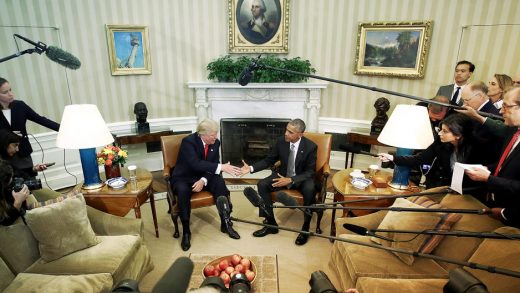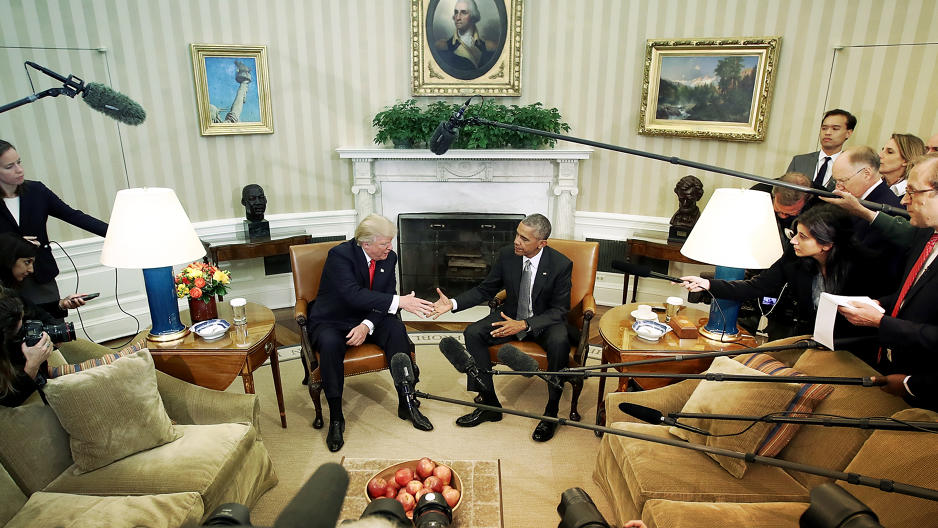Does Trump’s Rise Spell The End Of Empathetic Leadership?
Late last week, as President-Elect Donald Trump wrangled a chaotic transition team into order, the outlines of his approach to executive leadership started to fall into place. Nominating Jeff Sessions attorney general, Michael Flynn his national security adviser, and Mike Pompeo as CIA director, Trump made clear his intent to follow through on his toughest campaign stances, particularly on immigration and on combating Islamist violence.
On Friday, the New Yorker published a post-election interview with Barack Obama, in which editor David Remnick asked the outgoing president how Obama discussed Trump’s victory with his two daughters. “‘These are living organisms, and it’s messy,’” Obama says he explained. “‘And your job as a citizen and as a decent human being is to constantly affirm and lift up and fight for treating people with kindness and respect and understanding.’”
It reflects a model of leadership that had seemed nearly self-evident in recent years—one grounded in mutual support, authenticity, vulnerability, compassion, and above all, empathy—but whose authority may now look more doubtful. Not only do brands take pains to espouse these values with customers (including when faced with accusations to the contrary), but businesses also devote whole training budgets to hiring consultants who can teach their employees such interpersonal skills, apparently believing they’re the keys to effective leadership and collaboration.
Does Trump’s rise to power suggest that’s about to change—or that it was never true in the first place?
Alpha Leaders Aren’t New
Not necessarily. Dr. Gail Golden is the principal of Gail Golden Consulting, LLC, a management psychology firm based in Chicago, and she prefers to take the long view.
“The concept of the alpha-male business leader who’s extremely confident, extremely aggressive, not always a good listener—that’s been around for a long time,” she points out. And despite well-documented gender biases that tend to block their paths to leadership, some women share those traits, too. Trump “may be a particularly striking example of that pattern,” says Golden, “but this is not something we’ve never seen before.”
She also doubts Trump’s leadership style will have much trickle-down effect on business leaders. “If anything,” she says, “I think the stereotype—fair or not—is that government isn’t very good at getting the job done. At least in the minds of many corporate leaders, it’s seen as patronage-heavy and secret deals and handshakes that aren’t necessarily in the best interests of the enterprise.”
Ironically enough, that backroom deal-making is precisely what Trump campaigned on eliminating. And while the president-elect’s promise to “drain the swamp” of corporate influence seems undermined by the bankers and lobbyists he’s assembling to lead his administration, Golden says the impression that government isn’t much of a role model for business is widespread enough to transcend politics. “Corporate leaders are not likely to be heavily influenced by how Obama or Trump or Clinton would have managed their transitions.”
How Less-Empathetic Leaders Can Still Lead Well
But even if Trump’s leadership style doesn’t upend everything we know about leadership, it’s still likely to change how things get done around Washington, and there are already some indications of how.
New Jersey Governor Chris Christie, who became one of the first of Trump’s bitter primary rivals to rally to the president-elect’s side, was abruptly fired from the transition team as the “Bridgegate” scandal continued to unspool. Trump’s son-in-law Jared Kushner is said to have taken charge of giving Christie and his allies the boot, with the New York Times reporting a degree of “score settling” in the shakeup.
But Golden points out that even this isn’t especially surprising. Trump, she says, “has made it very clear all along that if you cross him, you’ll be sorry. He doesn’t forget, and he doesn’t forgive, and he holds grudges.” Sessions and Flynn were among the first high-profile conservatives to back Trump in his bid for the presidency, and their enthusiasm didn’t flag, even when fellow Republicans began to defect. Leaders virtually always reward their loyalists, Golden says, and there’s nothing inherently wrong with that.
What really matters, in her view, are two key things: First, that leaders assemble teams where there’s “diversity of thought” and, second, that they are seen to make those decisions intentionally.
Diversity of thought. “A concern I would have is if Trump is filling his leadership team with Trump clones, they are not going to have the agility, they aren’t going to challenge each other in the ways that, ideally, a leadership team would do.”
Indeed, there’s research to suggest that diversity does correlate to a range of positive business outcomes. Golden mentions widely cited studies that link the number of women in companies’ staff and on their executive teams with how well those companies perform. And there may be reason to believe that one of the quickest shortcuts to “diversity of thought” is through demographics: Bring in people from widely different backgrounds and experiences, and they’ll stand a pretty good chance of seeing challenges, opportunities, and one another more differently than people who all fit a similar profile.
In any event, says Golden, “If it’s all groupthink, you run a very high risk of driving right off the cliff together, regardless of what the nature of the groupthink is.” A West Wing packed with highly empathetic Obamas, in other words, may be no more effective than one staffed with only hard-driving Trumps.
Intentionality. Empathy isn’t everything, says Golden, and the brand of compassionate, collaborative, people-oriented leadership simply isn’t the only effective approach, no matter what some leadership coaches and consultants may believe.
There are many examples of “alpha” leaders—both historically and today—who run successful organizations with strong, healthy cultures, says Golden. She points to a 2004 article in Harvard Business Review that lays out a research-backed strategy for coaching this type of leader, rather than trying to force them into molds they’ll never fit. Among other things, she says, this is where intentionality comes in.
“Even if a senior leader blows his or her stack, they [need] to do it with intention—because they’ve decided that ‘losing my temper at this point is going to be good for me, good for the organization, or good for the country.’” One of the most troubling features of Trump’s transition, in this view, is the impression of a process spinning out of control.
“It isn’t going to do you any good to look chaotic,” says Golden. Particularly in highly visible roles, you don’t just want to make decisions intentionally, “you also want to be seen to be using intentional leadership. When it looks like your team is careening all over the place, that is damaging to a leader’s credibility.”
This has a symbolic impact, too. When Canadian Prime Minister Justin Trudeau appointed a cabinet comprised of 50% women and was asked why, Golden points out, “His answer was, ‘It’s 2015.’” As she sees it, that was valuable not just because it showed what Trudeau’s intentions consisted of, but also for the simple fact that it showed intent. “That wasn’t an accident,” she adds.
If Trump assembles a cabinet dominated by white men who are all from the same socioeconomic circle, as appears to be happening, Golden says, that won’t be interpreted accidentally either. But while it may not communicate much empathy or inclusiveness, it will still reflect a degree of intentional leadership—even if many are sure to disagree with its substance, or one that proves groupthink-prone and ineffective.
By this logic, Trump’s approach to executive power, whatever it turns out to be, can’t totally delegitimize the kind Obama embraced, because good leadership rests on criteria that leaves room for both of their approaches—even if in dissimilar degrees.
“Certainly,” reflects Golden, “I would say for myself that I’d prefer to work for a leader who is more compassionate and people-oriented. But as I look across businesses, I see great businesses where there’s an alpha male in charge,” she says. “There’s no one simple answer.”
Fast Company , Read Full Story
(60)














